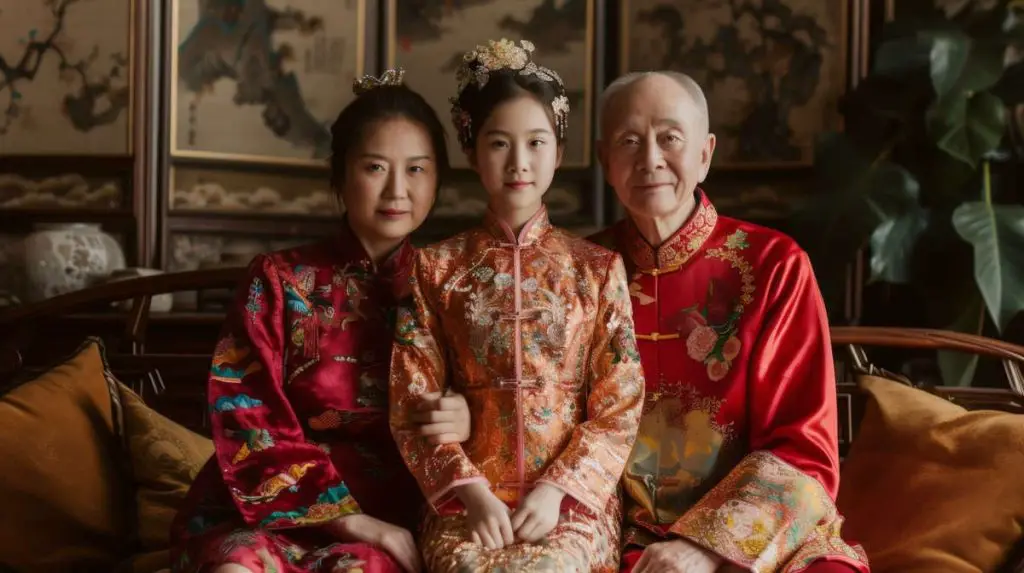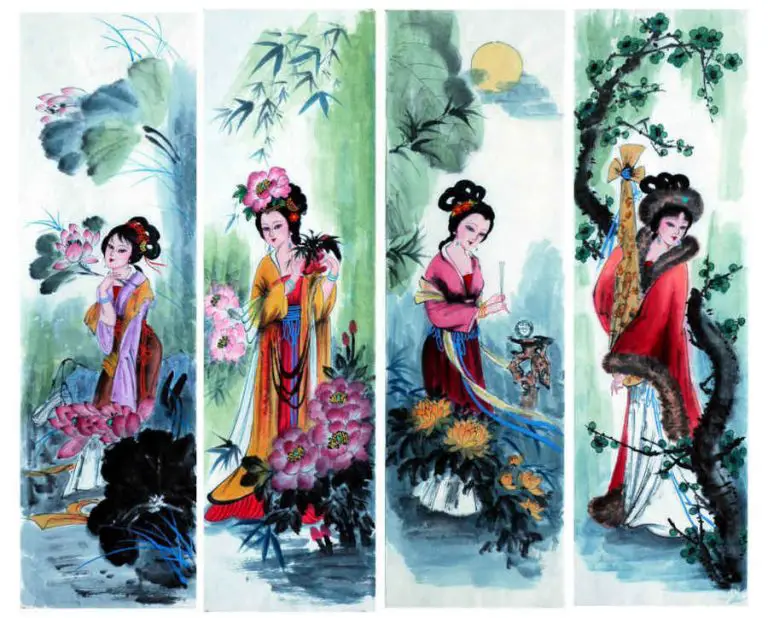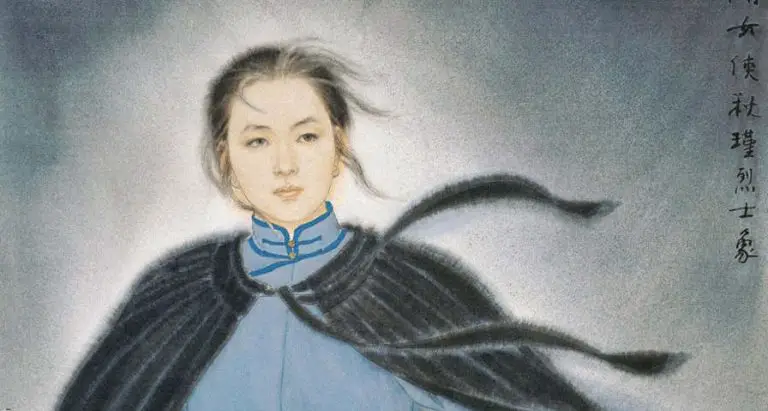Familial values heavily influence each person’s development within Chinese culture. These values, which include an emphasis on education, a strong work ethic and persistence, respect for elders, harmony, and sacrifice and duty, are firmly embedded in Chinese culture and taught to children from an early age.
In this article, we will look at each of these values in depth, emphasizing their significance in influencing the personal development of individuals in Chinese families.
Emphasis on Education
Education is extremely important in Chinese families since it allows for upward mobility and personal growth. Chinese culture places significant emphasis on academic success, hard work, and discipline, imparted from a young age by both parents and grandparents.
Chinese families value education highly because they see it as a means of securing a brighter future. This emphasis on education is profoundly rooted in Chinese culture, which has a long tradition of valuing knowledge and learning. Because of this, parents often devote quite a lot of time, money, and energy to their children’s education. (1)
Parents raise their children to respect perseverance, hard work, and self-discipline—qualities considered necessary for success in both academic and professional endeavors. Parents frequently set high standards for their children, urging them to strive for greatness and step outside of their comfort zones.
Parents and teachers often collaborate closely to monitor their children’s development, provide extra help at home, and foster a strong work ethic. This collaborative approach to teaching instills in children a feeling of duty and responsibility, preparing them for the difficulties of their academic and professional careers.
Related reading: Finding Personal Growth Lessons In Ancient Chinese Tales – Opens in new tab
Work Ethics and Perseverance
The Chinese cultural ideal goes beyond simply achieving good grades. The value placed on hard work, perseverance, and self-discipline is deeply ingrained in family upbringing. Parents and elders become inspirational figures, often sharing stories of their own struggles and triumphs to illustrate the importance of dedication. These stories emphasize the power of resilience—the ability to bounce back from setbacks and keep going in the face of challenges.
This focus on perseverance isn’t about blind effort. The concept of 步步高升 (bù bù gāo shēng) translates to “rising step by step.” It emphasizes the value of continuous improvement, where consistent effort and a willingness to learn pave the way for long-term success. Even when faced with initial difficulties, it encourages children to find ways to improve their skills. This cultivates a growth mindset, perceiving challenges as chances for learning and strengthening.
“Chinese families instill in their children a strong work ethic and resilience.” Professor Zhang Wei – Sociologist.
Confucian Values and Filial Piety
Confucian values, such as respect for authority, conformity, and obedience, have cultivated a top-down, adult-directed learning culture in both the home and the classroom in China (2). The concept of Guan (3), which emphasizes teaching children to exhibit proper or expected behaviors, has influenced Chinese mothers to traditionally play instructor roles during mother-child play interactions.
Combining this approach with the value of filial piety, which emphasizes compliance, courtesy, manners, and a deep respect and obligation toward one’s parents and ancestors, fosters a strong work ethic and a sense of duty in children.
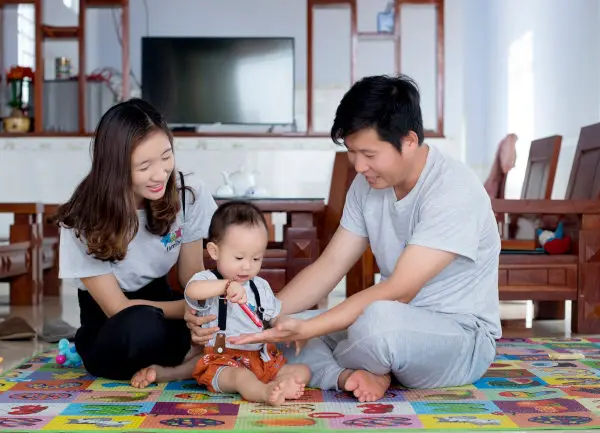
Respect for Elders
Respect for elders is a fundamental value in Chinese families, shaped by the concept of filial piety, which emphasizes love, respect, and care for one’s parents, elders, and ancestors. This traditional virtue, deeply rooted in Confucian philosophy, has played a significant role in shaping Chinese family dynamics and personal development.
Filial piety is a cornerstone of Chinese family values, with children taught to show deference, obedience, and care towards their elders from a young age. This practice promotes humility, empathy, and social harmony within the family and in society as a whole. Traditional Chinese families view elders as a source of wisdom and spirituality, rarely questioning their authority.
The practice of filial piety involves both material and spiritual support, with children providing for their parents’ physical needs and showing them respect and reverence. This mutual support and respect form a connected relationship, where the material support provided by children helps cultivate emotional and moral respect, and the requirement for respect generates emotional and moral restrictions on support. (4)
The traditional Chinese emphasis on the importance of family and interconnectedness significantly impacts a child’s drive toward success and overall well-being. By building a strong bond with their children during the first few years of their lives, parents instill a deep sense of respect and obligation towards their elders, which in turn influences their pursuit of success and overall happiness.
In modern Chinese societies, the practice of filial piety has decreased due to the rise of the nuclear family, individualism, and the loss of status among the elderly. However, the core value of respect for elders remains central to Chinese culture, with caregiving for elderly people still largely relying on family obligations, particularly in personal ways.
“Respect for elders is deeply ingrained in Chinese culture,” explains Dr. Chen Mei, a cultural anthropologist. “It’s not just about obedience; it’s about honoring the wisdom and experience of our ancestors.”
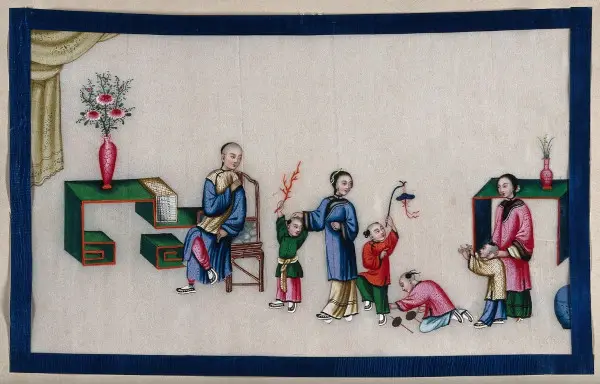
“Chinese family home. Painting Chinese” is marked with CC0 1.0 .
Importance of Harmony
Harmony is a fundamental cultural value in Chinese families, emphasizing the importance of interpersonal relationships, conflict resolution, empathy, and cooperation. This value is deeply ingrained in Chinese culture and is embodied in the concept of “External Harmony” (wài hé, 外和), which refers to good relationships with others, society, and the environment.
The concept of harmony encourages family members to respect each other’s opinions, communicate openly, and resolve conflicts peacefully (5). This approach to conflict resolution fosters empathy, understanding, and cooperation, which are crucial for building strong family bonds.
The Role of Benevolence in Harmony
The Chinese concept of benevolence, or “Rén” (rén, 仁) in Confucianism, emphasizes the importance of loving others and being kind to oneself and others. This concept fosters positive relationships and social harmony, closely aligning with the concept of harmony. In Chinese families, benevolence is a crucial value that encourages family members to be kind, understanding, and supportive of each other. (6)
Familial Conflict Resolution Strategies
| Strategy | Description | Example Scenario |
|---|---|---|
| Open Communication | Encouraging honest dialogue and active listening to address concerns and find mutually acceptable solutions | Family members hold a family meeting to discuss differences and reach a compromise. |
| Mediation | Involving a neutral third party to facilitate discussions and help resolve conflicts amicably | Seeking assistance from an elder family member or a trusted family friend to mediate a dispute. |
| Compromise | Finding a middle ground by making concessions and accommodating each other’s needs. | Siblings agree to take turns choosing activities to do together to accommodate everyone’s interests. |
| Empathy and Understanding | Putting oneself in the other person’s shoes to understand their perspective and emotions | Acknowledging the feelings and concerns of a family member before discussing potential solutions. |
Related reading: Exploring The Importance Of Family In Chinese Culture – Opens in new tab
Values of Sacrifice and Duty
The values of sacrifice and duty are deeply ingrained in Chinese family upbringing, where individuals are encouraged to prioritize family needs over personal desires. Children from a young age experience this cultural emphasis on selflessness and responsibility, which shapes their personal development and contributes to the well-being of the family unit.
Fulfilling familial obligations is a primary way to express this value. Children are taught to contribute to the family by helping with household chores, caring for younger siblings, and assisting in the family business. This sense of duty extends beyond the immediate family to include extended relatives, particularly elderly ones. Children are taught to show respect, care, and obedience towards their elders, fostering a sense of humility, empathy, and social harmony.
The importance of family and the feeling of interconnectedness begin at an early age. Parents spend large amounts of time with their small children, showering them with love and affection for the first few years of their lives. Alone time is not emphasized in traditional Chinese culture. Rather, parents spend the first few years of their little one’s life building a strong bond with their children.
As children raised with traditional Chinese values hold such great respect and a sense of interconnectedness with their family, their pursuit of success is not one that is only individually motivated. Rather, children raised in an interconnected family will find motivation in knowing that their success will greatly contribute to the happiness and overall well-being of their family. (7)
“Sacrifice and duty are fundamental principles in Chinese family upbringing,” states Professor Wang Lin, a historian specializing in Chinese culture. “Individuals are encouraged to prioritize family needs over personal desires, fostering a sense of unity and interconnectedness.”
End Words
In conclusion, Chinese family values play a significant role in shaping the personal development of individuals within the culture. Chinese culture deeply instills these values in children from a young age, emphasizing education, work ethic and perseverance, respect for elders, harmony, sacrifice, and duty.
By prioritizing these values, Chinese families contribute to the well-being of the family unit and foster the development of individuals who are responsible, empathetic, and committed to their personal and professional success. Understanding these values is essential for anyone seeking to understand Chinese culture and the personal development of individuals within it.
Related reading: How Ancient Chinese Wisdom Holds the Keys to Modern Personal Growth– Opens in new tab
An Introduction to Chinese History & Culture (Aff.link)
Dive into China’s rich past and intriguing present! From ancient dynasties to modern powerhouses, uncover Chinese culture facts, pivotal moments, and the captivating tales that have shaped this vast nation.
Sources
1.Leung, Janet T.Y. and Shek, Daniel T.L.. “All I can do for my child” – development of the Chinese Parental Sacrifice for Child’s Education Scale” International Journal on Disability and Human Development, vol. 10, no. 3, 2011, pp. 201-208. https://doi.org/10.1515/ijdhd.2011.037
2. Zhang, Y.; Leung, S.K.Y.; Li, H. Parental Play Beliefs in the Developing Areas of China: A Multiple Case Study. Educ. Sci. 2021, 11, 625. https://doi.org/10.3390/ educsci11100625
3. Wu, Ming-Yeh. (2012). The Concept of Guan in the Chinese Parent-Child Relationship. 10.1007/978-94-007-4081-5_2.
4. Hua Li, Gengxuan Wu. Implications of China’s filial piety culture for contemporary Elderly Care. 2021, Shandong Normal University, DOI: https://doi.org/10.1590/0101-3173.2022.v45esp2.p69
5. Hao, L. (2022). The power of family: The impact of family culture on marriage stability in China. Chinese Journal of Sociology, 8(1), 79-103. https://doi.org/10.1177/2057150X211067297
6. Li Y, Cui H. On the Value of the Chinese Pre-Qin Confucian Thought of “Harmony” for Modern Public Mental Health. Front Psychol. 2022 Jun 2;13:870828. doi: 10.3389/fpsyg.2022.870828. PMID: 35719596; PMCID: PMC9203267.
7. Jeung, Russell M., Seanan S. Fong, and Helen Jin Kim, ‘The Yi of Family Sacrifice: Chinese Americans’ Highest Values’, Family Sacrifices: The Worldviews and Ethics of Chinese Americans (New York, 2019; online edn, Oxford Academic, 23 May 2019), https://doi.org/10.1093/oso/9780190875923.003.0005, accessed 15 Apr. 2024.
Stay in Touch
 Join our newsletter by using the forms on this website or click here!
Join our newsletter by using the forms on this website or click here! Follow us on Google News
Follow us on Google News Follow us on Facebook
Follow us on Facebook
Image by SerenityArt from Pixabay

